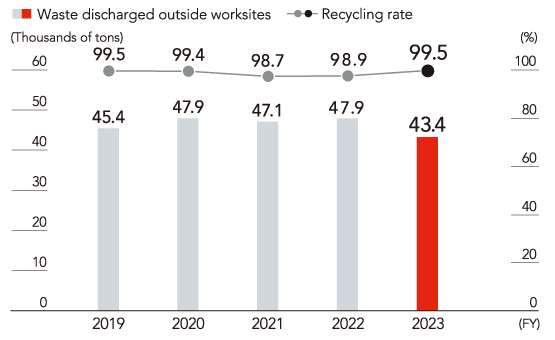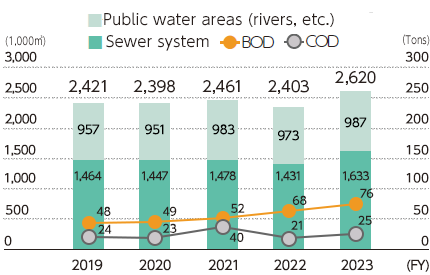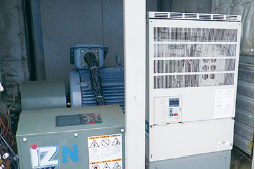Established as an environmental initiative, the Nichirei Group’s Environmental Policy includes a theme of promoting sustainable recycling. The Group recognizes that corporate business activities have a considerable impact on the natural environment. Emitting pollutants and using chemicals through business activities has an effect on the air and soil, and expanding business activities results in more waste being generated and a greater effect on valuable resources. The Group’s business, in particular, relies heavily on natural ecosystems for the procurement of ingredients. Any loss of these ecosystems would be a significant business risk, and in addition, the generation of food waste is a major challenge.
Recognizing the issues outlined above, the Group is making the best use of limited global resources in cooperation with its suppliers, partners companies and consumers, and in addition, through its business activities, is promoting reductions of waste and pollutants as well as the reuse and recycling of resources. The Group is also helping build recycling-oriented social systems by procuring recyclable resources and working to develop associated mechanisms.
Two medium-term environmental targets adopted by the Group are to maintain a waste recycling rate of at least 99% at its food factories and distribution centers, and to reduce residual animal and plant material at its food factories in Japan.
As a material matter for the Nichirei Group, we have set a KPI for and are actively working to reduce the amount of and recycle the food residue and waste generated by our business activities.
The Nichirei Group is reducing the amount of industrial and general waste from its business activities. We aim to maintain a waste recycling rate of 99% by incorporating a variety of recycling methods.
Total Waste Recycling Rate for All Facilities
| FY2023 Result | FY2024 Plan | FY2025 Target | FY2031 Target |
|---|---|---|---|
| 99.5% | 99% | 99% | 99% |
●Waste Volume and Recycling Rate

To reduce waste generated at our production facilities, Nichirei Foods is undertaking various initiatives. These include production management, initiatives to prevent problems, and the recycling of processing residue, such as raw ingredients not turned into products.
Process residues generated at the plant are recycled into fertilizer and feed for effective use. The Group plans to continue reducing the amount of waste generated by setting target values, while making the most effective use of processing what residue is inevitably produced.
Nichirei Foods is participating in the Japan Project of the “10x20x30” Food Loss and Waste Initiative, a movement by retailers and food manufacturers worldwide to reduce food loss and waste. Advocated by the World Resources Institute (WRI), a U.S. think tank that conducts policy research and develops technologies at the intersection of the environment and human development, the 10x20x30 initiative brings together 10 of the world’s biggest food retailers and providers to each engage with 20 of their priority suppliers with the aim of halving rates of food loss and waste by 2030.

In joining the 10x20x30 Japan Project, Nichirei Foods set a target for FY2031 to reduce animal and plant residues at domestic food factories by 50% compared with FY2020. We also aim to maintain a recycling rate of at least 99% for waste (including non-food items) at all business sites in Japan. To achieve these targets, we are working to reduce the amount of waste generated by revising production processes and product designs, to donate as food what we previously disposed of as waste, and to conduct recycling, including conversion to animal feed and industrial products.
The water used at food factories becomes wastewater containing food-related organic matter, detergents, and disinfectants. The Nichirei Group cleans its factory wastewater using disposal equipment and only releases it outside the factory once it complies with emissions standards stipulated by law.
●Nichirei Group Wastewater and Drainage Load

In FY2023, we continued to have no materials subject to reporting under the Pollutant Release and Transfer Register Law* (handled in quantities of 1 ton or more). We will continue to manage chemical substances appropriately.
Polychlorinated biphenyls (PCBs), a group of man-made compounds, were previously used as insulating oil in transformers, but their use was banned in the 1970s, after their toxicity became apparent. In Japan, equipment that has been confirmed to contain PCBs is being appropriately stored in compliance with standards set by law. Currently, disposal is being carried out systematically, based on the capacity of the nation’s five government-run PCB disposal plants. In FY2023, seven units continued to be collected, transported, and processed throughout the Group.
The asbestos that was found to have been sprayed on the underside of the roof, and which had the possibility of spreading, was removed and disposed of during an inspection in FY2006. In addition, when demolishing office buildings that have been closed, the Nichirei Group does another survey and takes legally compliant and appropriate steps to dispose of any building materials containing asbestos.
In addition to fulfilling the appropriate disclosure requirements when selling, buying, or renting land, the Nichirei Group does evaluations of soil contamination and carries out the appropriate management.
In FY2023, we performed appropriate treatment in the following matters in accordance with laws and regulations.
Nitrogen oxide (NOx) and sulfur oxide (SOx) are produced when fuel oil and gas are burned in food factory boilers. Through proper facility management at its factories, Nichirei is complying with emissions standards stipulated by law and aiming for an overall reduction in emissions volume. The Nichirei Logistics Group is promoting increased logistical efficiency through joint shipping and modal shifts making use of railways and ferries. The Group is making progress on the reduction of NOx and particulate matter (PM) emissions by using exhaust regulation-compliant vehicles, conducting proper vehicle maintenance, and promoting such initiatives as eco-driving. Furthermore, there are no emissions from the Nichirei Group’s business corresponding to the volatile organic compound (VOC) emission standards.
By 2030, we will have switched to natural refrigerants for 75% of equipment used by Nichirei Logistics Group (based on tons of equipment excluding leased equipment), including overseas facilities, and 100% of the freezers used by Nichirei Foods at its food factories and investee factories in Japan.

Nichirei Logistics Group works to reduce refrigerant leakage from existing refrigerators. In addition to carrying out regular inspections for refrigerant leakage, in FY2022 it introduced detectors capable of 24-hour measurement.